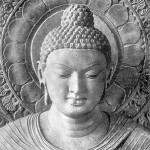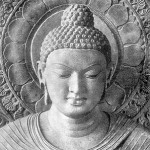From A Faith Perspective Column February 13, 2017
 Last November I attended a large gathering at The Garden of Reflection 9-11 Memorial organized by a combination of interfaith clergy and elected officials. The evening was hastily called following a few expressions of xenophobia that had occurred in schools and a local shop. One of the organizers had printed up black and white signs that read simply: NO PLACE FOR HATE. These are words that all religious traditions embrace, as does Buddhism.
Last November I attended a large gathering at The Garden of Reflection 9-11 Memorial organized by a combination of interfaith clergy and elected officials. The evening was hastily called following a few expressions of xenophobia that had occurred in schools and a local shop. One of the organizers had printed up black and white signs that read simply: NO PLACE FOR HATE. These are words that all religious traditions embrace, as does Buddhism.
Whatever your political perspective, we are living in an historical moment that requires us to stand up for what matters. We are called upon to stand against hatefulness, especially when directed towards those who are vulnerable or perceived as different from us by superficial characteristics such as physical appearance or national origin.
Buddhism asks us to think of the best of human goodness, and to embody that in our relationships with others, knowing that we all fall short of that ideal. We need not judge ourselves when we don’t do everything we think we should, or less than others. Instead we are asked to open our hearts with compassion and respond to what we see, hear, and know. The human heart has the freedom and the intrinsic feeling to choose love, dignity and respect. Hatred causes suffering; let it go. Love and generosity bring that suffering to an end, and we should strive to foster them.
Throughout recorded history our religious and thought leaders have sounded similar refrains when faced with irreconcilable differences. Recently we honored the life of Martin Luther King. One of his sayings of wisdom in this regard is worth repeating: “I’ve decided to stick with love. Hate is too great a burden to bear.” And the Buddha counseled: “Hatred never ends by hatred but by love alone is healed. This is the ancient and eternal law.”
As one of my favorite Buddhist teachers, Jack Kornfield, says, “Let yourself become a beacon of integrity, with your thoughts, words and deeds. Integrity in speech and action, virtue and non-harming bring blessings.” It takes effort to attempt to embody respect and cultivate compassion for all. In our individual lives, we are continually faced with small and large decisions that bring into question our ability to rise to this challenge. If we used the highest standards to test all our behaviors, we could feel paralyzed to act. What food can I eat without adding to the suffering of an underpaid migrant farm worker? What clothes should I buy without adding to the suffering of children working without the benefit of human rights in third world countries? Am I bad person if I don’t take all this into account?
Buddhism doesn’t answer these questions for us, with specific rights and wrongs, but asks us to simply try our best to live with an open heart, and respond to the conditions we face mindfully, so we are less likely to harm other beings. As we move through our lives in community, we strive to learn from and support each other, knowing that we are not as separate from one another as we often feel.
In a recent issue of the Buddhist periodical, Lion’s Roar, Jack Kornfield reminds us that the Buddhist path is not fulfilled through meditation and contemplation, which is how it is often portrayed. He says, “Inner peace, freedom and joy develop only when paired with the outer teachings of virtue, respect and mutual care. The foundation of Dharma (Buddhist teachings) is relational, built on generosity, virtue and loving-kindness. The Path to human happiness and liberation requires Right Intention, intentions that are free from greed, hatred and cruelty; Right Speech, speech that is true and helpful, not harsh, not vain, slanderous nor abusive; and Right Action, actions that are free from causing harm, killing, stealing and sexual exploitation.” Our country’s leaders could do worse than embracing this credo, which is not so different than the teachings of our more familiar Judeo-Christian heritage.




